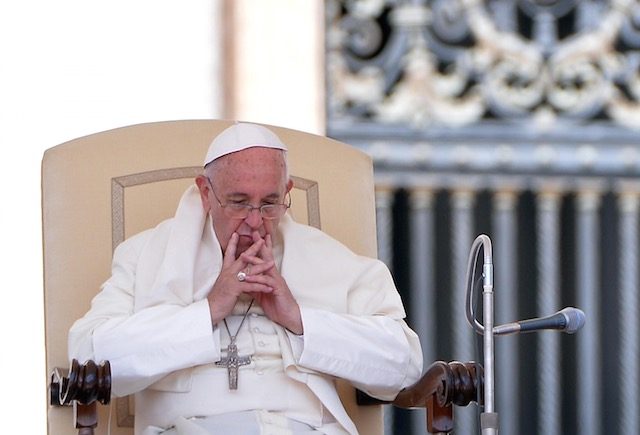SUMMARY
This is AI generated summarization, which may have errors. For context, always refer to the full article.

VATICAN CITY – Pope Francis’s statement on the environment, seen as a potential game-changer by Green groups, comes 6 months before international leaders gather in Paris to try and seal a deal to reduce carbon emissions.
The encyclical, a collection of principles to guide Catholic teaching entitled “Laudato Si” (Be Praised), warns that global warming threatens the planet – but will it have any impact on the global debate?
Q: Will Francis’s message be heard beyond the Roman Catholic Church’s walls?
A: The outcome of the Paris talks, which will include representatives of almost 200 countries, is still to play for. Francis’s thoughts will be shared with over 20 million followers on Twitter, and is likely to have a big influence on very Catholic countries such as emerging powerhouses Brazil, Mexico and South Africa, as well as Christian countries like the United States.
Francis drew widely on the opinions of experts in preparing his thesis, and has the support of a series of religious figures from rabbis to imams and Buddhists. As Vatican expert Iacopo Scaramuzzi puts it, “the pope’s pressing message is addressed to everyone, not just Catholics, and tries to find common ground with non-believers and other religions.”
Q: Why is it likely to provoke criticism in some quarters?
A: Debate has been raging over the past few decades over whether global warming is man-made, with skeptics insisting that natural causes have contributed to the phenomenon of rising average temperatures. Francis’s position is clear: he not only calls for action to phase out fossil fuels, but points the finger at big industry and blames first-world countries for failing to act.
The pope “presents a fundamental criticism: the political sphere’s submission to technology and financial powers,” papal biographer Marco Politi said.
It is the poor and downtrodden which get Francis’s support against wealthy economies accused of superficiality, waste and an utter disregard for ethics.
But while he may be heralded a hero on the left for his activism, Francis will disappoint some by refusing to budge on the issue of birth control. The Church believes the earth can nourish all its inhabitants, contrary to the claim that one of the biggest factors behind global warming is overpopulation.
Q: Is the green thesis a radical change of thinking for the Vatican and Church?
A: This is the first encyclical to be entirely dedicated to the planet, rather than specific issues such as bioethics or family life. It is typical of Francis to root his message in “the viewpoint of the poor, the principal victims of global warming,” as Scaramuzzi puts it. But the Argentine is not the first pope to be interested in green matters.
Since the Second Vatican Council (1962 to 1965) popes have paid increasing attention to the relation between pollution, waste and poverty. Francis’s predecessor, Benedict XVI, signed an agreement making the Vatican Europe’s first carbon-neutral state and had solar panels installed there.
Francis’s personal touch is to criticize the fallout of economic liberalism, and call for a revolution of “restraint” against what he has termed “the globalization of indifference.”
The document’s ambition, Vatican expert John Allen says, is not so much to change the political landscape but rather individual attitudes on the basis that “if you re-orient lives and attitudes, the politics will take care of itself.” – Jean-Louis De La Vaissiere, AFP / Rappler.com
Add a comment
How does this make you feel?
There are no comments yet. Add your comment to start the conversation.